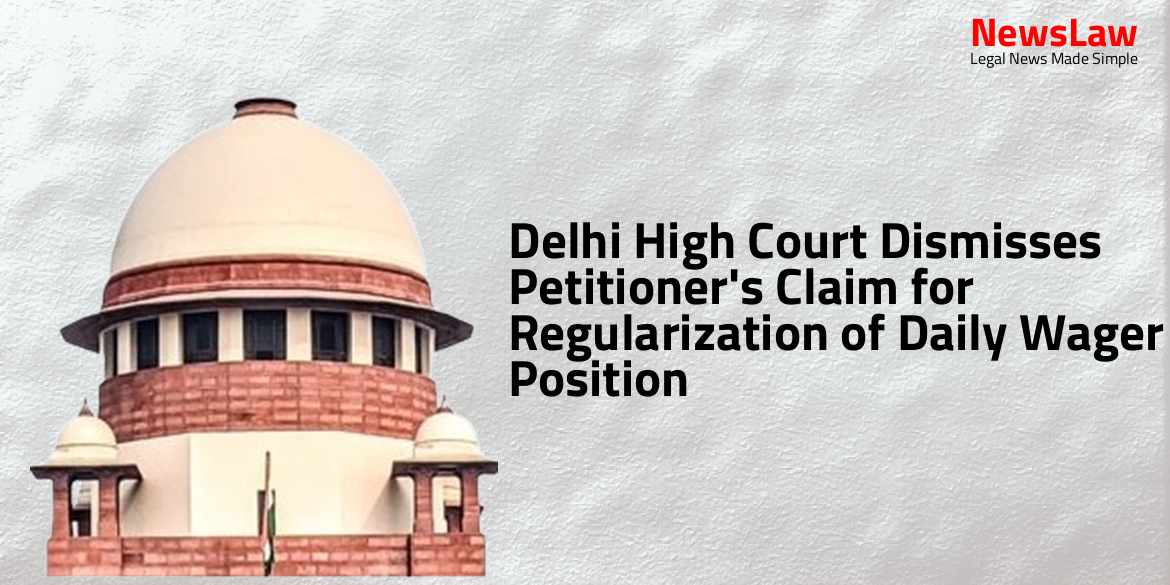In a recent case heard by the Delhi High Court, the claim for regularization of a daily wage worker’s position was dismissed. The petitioner had sought reinstatement and full wages after being terminated by the respondent. The High Court’s decision sheds light on the legal aspects of daily wage employment and the challenges faced by temporary workers. Stay informed with our blog post for more details on this important case.
Facts
- The petitioner was appointed as a beldar / mazdoor on muster roll with the respondent in 1995.
- On 1 July 1999, the petitioner’s services were terminated by the respondent.
Arguments
- The petitioner sent a demand notice seeking reinstatement and full wages.
- The Labour Court passed an award rejecting the claims of the petitioner.
- The petitioner filed the instant petition, stating that the award is illegal, perverse, and contrary to the records.
- The petitioner’s counsel argued that the Labour Court failed to consider that the petitioner was a daily wage worker and cannot compel regularization of his position.
- The counsel requested that the petition be allowed and the sought reliefs be granted.
- It is contended that the petitioner being a daily-wager, his service can be terminated at the discretion of the respondent.
- The engagement or appointment of a worker on a daily wage or casual basis can come to an end when it is discontinued.
- The impugned awards passed by the learned Tribunal were considered illegal by the petitioner as the claim seeking reinstatement was disallowed without any defence raised by the respondent.
- The respondent argued that the impugned award passed by the learned Tribunal was in accordance with the law, stating that the petitioner was employed as a daily-wager and his services ended when terminated.
Analysis
- The claimant, as a daily wager, is not entitled to reinstatement or compensation as his employment ends when disengaged by the management.
- Courts have upheld public authorities’ discretion in regularization of temporary employees to avoid financial burden.
- The writ jurisdiction is not an appellate court and temporary employees do not have a vested right to seek regularization.
- Exception for seeking regularization exists only for ad-hoc/temporary/contractual employees appointed at a sanctioned post according to recruitment rules.
- MCD, being funded by public money, should not bear unnecessary liabilities, and hence, the claimant cannot be granted compensation.
- Contractual appointments end with the completion of the project.
- Based on the claimant’s own admission as a daily wager, he has no right to reinstatement, regularization, or permanency.
- Challenging a finding of fact in certiorari proceedings is not valid on the grounds of insufficient evidence.
- The Tribunal rightly held that the claimant, as a daily wage worker, is not entitled to reinstatement or compensation.
- The rule of equality in public employment is a basic feature of the Constitution.
- Engagement or appointment on daily wages or casual basis ends when discontinued.
- Financial burden of regularization or permanence cannot be imposed on the State.
- Courts cannot insist on permanence for temporary employees who are not needed permanently.
- Reliance was placed on the judgment in Ajay Kumar Sharma vs. Presiding Officer, Labour Court No VI.
- Daily wages or casual basis employment concludes when discontinued.
- The learned Tribunal opined on the position of law regarding employment of daily wage workers in the judgment of Umadevi v. State of Karnataka.
- The Hon’ble Supreme Court’s decision in the case of Umadevi v. State of Karnataka emphasized the temporary nature of daily wage employment and the absence of any right or claim for regularization of such employment.
- The learned Tribunal referred to the judgment in Umadevi v. State of Karnataka to support the understanding that daily wage workers cannot make a claim for regular employment on the basis of their temporary and ad-hoc nature of engagement.
- The impugned award dated 2 April, 2004 is deemed legal and free from any illegality.
- The petitioner failed to present a strong case in his favor for the intervention of the Court.
- The Court sees no reason to issue a writ of certiorari based on the petitioner’s arguments.
Decision
- The instant petition has been dismissed.
- Any pending applications associated with the petition are also dismissed.
Case Title: KISHAN PAL Vs. MCD (2024:DHC:4189)
Case Number: W.P.(C)-4607/2010



